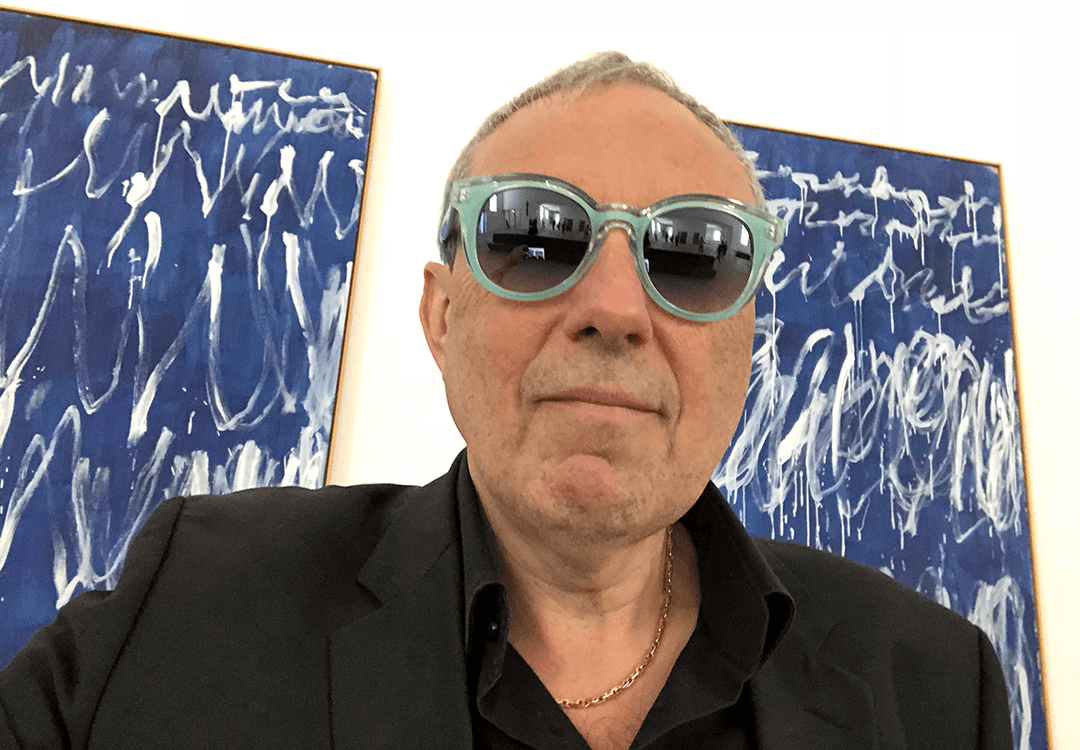Mathematician Peter Markowich named 2022 AMS Fellow

Creative self-portrait of mathematician Peter Markowich in front of paintings by Cy Twombly. Photo courtesy Peter Markowich
On November 1, 2021, the American Mathematical Society (AMS) announced its 2022 class of new Fellows. KAUST Distinguished Professor of Applied Mathematics and Computational Science Dr. Peter Markowich joins 45 mathematical scientists from around the world named 2022 Fellows who are recognized by peers and the Society for their outstanding contributions to the creation, exposition, advancement, communication, and utilization of mathematics.
Markowich is honored for his "contributions to partial differential equations, particularly the mathematical and numerical analysis of dispersive equations." He applies differential mathematics to disciplines such as physics, artificial intelligence, biology and engineering. One ongoing project involves working with plant physiologists to research the leaf venation patterns of plants, and apply knowledge learned about their biological transport systems to neuron networks in the human brain.

Closeup of a plant leaf shows branching veining patterns. Photo credit: Peter Nijenjuis /
CC BY-NC-ND 2.0 license
Fellows of the AMS represent the Society as a "public face of excellence" in mathematics, and are called upon to expand the network of mathematical leaders by selecting new Fellows, and advising the AMS Council on public matters as requested.
"It is an honor to welcome a new class of AMS Fellows and to congratulate them for their notable contributions to mathematics and to the profession," said AMS President Ruth Charney. "We extend our thanks to the nominators and members of the selection committee for their help in highlighting the outstanding achievements of their colleagues. Congratulations 2022 Fellows!"
A professor at KAUST since 2011 and formerly with Cambridge University, Markowich credits his approach to science and the field of differential equations to his time spent in the United States as a young man — from his postdoctoral job at a math research center in Madison, Wisconsin, to his appointment as an assistant professor at the University of Texas at Austin.
"Scientifically, I consider myself to be a product of U.S. mathematics," the Austrian-Italian researcher said. "The U.S. was then and still is a place where important ideas happen in science and mathematics. My time there informed so much about the way I think that carries into my life and work today. I've won quite a few awards from organizations in Asia and Europe, but this is my first award from America. That it comes from the most important mathematical society in the world has a lot of emotional significance to me."
He added that AMS is important to so many mathematicians because it honors those who work in areas of both applied and pure mathematics, and that his own way of thinking about math is in terms of the whole.
"Very often applied math uses tools from pure math," he said. "I want to produce science that is not only useful to specific applied fields but is also new to mathematics itself. Good applied mathematics always gives something back to math and not just the field of application." In this light, Markowich said that teaching students and helping them along the path is where the real reward of math happens.
The AMS appointment adds to his extensive list of honors and awards, including the Wittgenstein Prize from the Austrian Science Fund (FWF), the Wolfson Research Merit Award from the Royal Society, and lecture invitations at the International Council for Industrial and Applied Mathematics (ICIAM) and International Congress of Mathematicians (ICM). In early 2021 the Hamburg Institute for Advanced Study named Markowich a Fellow, an appointment that gives him the latitude to pursue his own research projects and connect KAUST with Hamburg mathematics. He is also a Foreign Member of the Austrian Academy of Sciences and Fellow of the European Academy of Sciences.
View the names, institutions, and citations of the full 2022 class of Fellows.
Related Links

